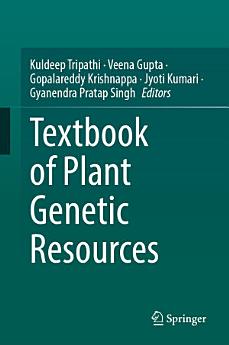Textbook of Plant Genetic Resources
About this ebook
The book provides complete information on recent technological advances in PGR science including management of genetic resources, conservation, tissue culture, cryopreservation, quarantine and bio-security-related topics. It has 17 chapters and covers the syllabus in depth with special focuses on crop wild relatives, crop genomics, policies issues, and also highlights the research priorities and importance of field translation. It catalogues both conventional as well as modern tools and provides innovative strategies for sustainable PGR conservation and utilization in climate change scenarios to meet the United Nations’ Sustainable Development Goals (SDG). It also brings together up-to-date information on various legislations of global policies like the Convention on Biological Diversity (CBD), International Treaty on Plant Genetic Resources for Food and Agriculture (ITPGRFA), Access and Benefit Sharing (ABS), and NAGOYA protocol.
This textbook is an all-inclusive collection of information, which is beneficial for postgraduate, and PhD students. In addition, it is also a reference material for agriculturists, plant breeders, seed technologists, plant pathologists, biotechnologists, biochemists, pharmacologists, agronomists, botanists, entomologists, social scientists, policy analysts and any other persons interested in getting information about plant genetic resources.
About the author
KULDEEP TRIPATHI, Senior Scientist, ICAR-NBPGR, New Delhi obtained his Doctoral degree from Indian Agricultural Research Institute, New Delhi in 2015. He has made enormous contributions to PGR management, including pre-breeding and genetic enhancement of pulses that work seems quite unparalleled. His classic research work on legumes has brought to his credit 04 Indian pulse core sets developed in lentil, pea, grasspea and cowpea; 26 legume genetic stocks registered. He published around 80 research papers in peer-reviewed national and international journals. Besides this, he has also been teaching and guiding MSc and PhD students at The Graduate School, ICAR-IARI, New Delhi. He received the NAAS Young Scientist Award (2024) and was selected as a NAAS Associate (2025).
VEENA GUPTA, Ex-Principal Scientist, ICAR-NBPGR obtained her Doctorate degree in Botany from Delhi University. Her scientific contributions in the area of PGR are well appreciated. She has been bestowed with Dr SABUJ SAHOO Life Time Achievement Award for her contributions to the PGR Conservation and Management and fellow of several scientific societies such as ISST (2005), ISPGR (2007), and International Society for Noni Science (2015). She had guided two M.Sc. students and six Ph.D. students for their degrees in PGR discipline. She had published more than 80 research papers and two books in her area of expertise.
GOPALAREDDY. K., Scientist, ICAR-SBI, Coimbatore obtained his Doctorate degree in Genetics from ICAR-IARI, New Delhi during 2016. Dr. Reddy developed 17 wheat varieties and 27 wheat genetic stocks to benefit multitude stakeholders. Dr. Reddy utilized modern breeding tools like genomic selection, MARS, MAS and GWAS to complement conventional breeding techniques to dissect complex traits in wheat. Published more than 40 research and review articles of national and international repute with high impact journals. Dr. Reddy was conferred with Nanaji Deshmukh award, AIASA young scientist award 2020, NEEDEF young scientist award 2021, and Dr. VS Mathur memorial award 2022.
JYOTI KUMARI, Principal Scientist, ICAR-NBPGR, New Delhi obtained her Doctoral degrees from ICAR-IARI, New Delhi in Genetics in 2005. Her major scientific contribution includes mega characterization and evaluation of ~22,000 wheat germplasm, development of core (2226 acc.) and minicore (224 acc.) set from the entire Indian national genebank. She has published more than 140 publications, including 103 research papers in national and international journals of high repute. She has developed four varieties in lentil and mungbean, and registered more than 40 genetic stocks . She is fellow of ISGPB and recipient of Dr. Harbhajan Singh Memorial Award from the ISGPB. As a faculty of Division of Genetics, she has guided twelve M.Sc. and six Ph.D. students of The Graduate School, ICAR-IARI, New Delhi.
GYANENDRA PRATAP SINGH, Ph.D. Director, ICAR-NBPGR and former Director, ICAR-IIWBR, Karnal have more than 3 decades of agriculture research including 10 years of teaching and more than six years of administration experience. Dr. Singh is instrumental in the development of 60 wheat and 03 barley varieties and 01 potato variety benefitting multitude farmers, consumers and industries. Dr. Singh largely focused in intrinsic and strategic research on abiotic stress that led to publication of 300 peer- reviewed research articles of high impact, 18 books, 65 book chapters, 57 technical bulletins, 55 popular articles, 05 Policy/Strategy papers. His strenuous efforts on advancing the R&D led to several accolades at national and international level by honouring with 17 individual awards. He is an elected fellow of 3 prestigious academies i.e. INSA, NASI and NAAS and also fellow of 3 registered professional societies. His acumen on leading research programs and visionary perspective garnered recognitions like Gene Stewardship Award from the Borlaug Global Rust Initiative, USA.




